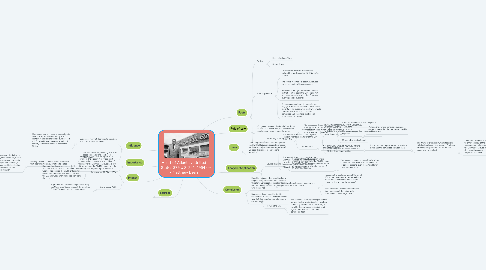
1. Impact
1.1. Katzenback v. McClung (1964)
1.1.1. Supreme Court case very similar to Heart of Atlanta v. U.S., where the Commerce Clause was used to enforce the Civil Right Act for restaurants. This case was ruled in favor of the U.S. and was a unanimous decision from the court.
1.2. U.S. v. Lopez (1995)
1.2.1. Supreme Court case deciding that the using the Commerce Clause to enact the Gun-Free School Zones Act was unconstitutional
2. Importance
2.1. The importance of the Civil Rights Act is obvious to the equality it provides most citizens today. However, the upholding of this law via the Commerce Clause held firm the authority of the Civil Rights Act and the authority of Congress to pass such acts.
2.1.1. Leading to clear communication nationwide that discrimination would not be tolerated
2.1.1.1. As a business professional, discriminating against customers, employees, etc, based on skin color, religion, etc. can have major consequences and put your company's future in jeopardy and lead to legal action against you as the owner or person performing the discrimination
3. Influence
3.1. Businesses may not discriminate based on skin color or religious views
3.1.1. Though our country needs to take action to have true equality in our country, the Civil Rights Act and it being upheld during Heart v. U.S. helped frame the new mentality of equality and discrimination in the United States
3.2. Has lead to equality on hiring practices based on gender and sex-based discrimination
4. Sources
4.1. Katzenbach V. McClung (1964) – U.S. Conlawpedia
4.2. United States v. Lopez (1995) – U.S. Conlawpedia
4.3. Textbook: The Legal Environment of Business, Text and Cases, 10th Edition, Cross & Miller
5. Facts
5.1. Parties
5.1.1. Heart of Atlanta Motel
5.1.2. United States
5.2. What Happened?
5.2.1. Owner of the Heart of Atlanta Motel violated the newly enacted Civil Rights Act of 1964
5.2.2. The owner, Moreton Rolleston Jr., refused to rent rooms to African Americans.
5.2.3. Motel owner brought an action to federal district court to deem the Civil Rights Act unconstitutional by stating that Congress overstepped its authority.
5.2.4. The owner argued that his motel did not engage in interstate commerce because the majority of his guests were local which made the case a local issue, so interstate commerce and, therefore, the Federal government had power
5.3. Procedural History
5.3.1. The federal district court ruled against Heart of Atlanta and in favor of the Civil Rights Act.
5.3.1.1. Why?
5.3.1.1.1. Court reasoned that 75% of the guests were from out of state
5.3.1.1.2. Motel was accessible to state and interstate highways
5.3.1.1.3. Owner advertised nationally
5.3.1.2. The owner appealed the federal district court ruling and the case went to the United State Supreme Court
5.3.2. The federal district court relied on the Commerce Clause as the backing for the ruling by linking interstate commerce and and the Commerce Clause to the Civil Rights Act.
6. Issue
6.1. Does Congress have the ability to enforce the Civil Rights Act on private businesses via the authority of the Commerce Clause? Or, does this exceed Congressional authority?
7. Rule of Law
7.1. Congress, by way of the Article 1 section 8 of the U.S. Constitution, has the ability to regulate commerce among the states
7.1.1. Congress uses this authority to enforce the Civil Rights Act to not allow discrimination of people of color in many ways (and in this case interstate commerce)
8. Analysis/Application
8.1. Presenting Sides of the Rule
8.1.1. Heart of Atlanta:
8.1.1.1. Congress overstepped its authority by using the Commerce Clause to regulate commerce in this case, believing that this case has nothing to do with commerce
8.1.1.1.1. Violates the owner's rights as a business owner to select the clientele he wants at his motel.
8.1.2. United States:
8.1.2.1. Congress does have the ability to regulate interstate commerce
8.1.2.1.1. This authority to regulate extends to all the states and the commerce between them
8.2. Court's Reasoning
8.2.1. Found that through sufficient evidence noted by the passing of the Civil Rights Act, large amounts of discrimination are found all over the country related to issues of interstate commerce
8.2.1.1. This reasoning supports the authority of the Commerce Clause because discrimination of colored persons, even at the "local level" impedes commerce
8.3. Facts
8.3.1. Discrimination of colored people was a prevalent issue nationwide
8.3.1.1. Regarding the local argument of the motel: "if it is interstate commerce that feels the pinch, it does not matter how local the operation that applies the squeeze"
8.3.1.2. Testimony from the Under Secretary of Commerce about the nationwide discrimination had a large impact
8.4. Viewing the Law
8.4.1. The Supreme Court slightly expanded the view of the law by viewing discrimination as not only a detriment to the quality of travel to those who were discriminated against, but was also a detriment to commerce itself
